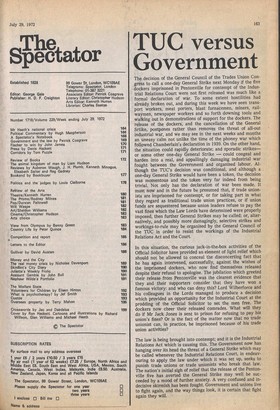TUC versus Government
The decision of the General Council of the Trades Union Congress to call a one-day General Strike next Monday if the five dockers imprisoned in Pentonville for contempt of the Industrial Relations Court were not first released was much like a formal declaration of war. To some extent hostilities had already broken out, and during this week we have seen transport workers, meat porters, blast furnacemen, miners, railwaymen, newspaper workers and so forth downing tools and walking out in demonstrations of support for the dockers. The release of the dockers, and the cancellation of the General Srtike, postpones rather than removes the threat of all-out industrial war, and we may see in the next weeks and months an uneasy calm not unlike the time of the phoney war which followed Chamberlain's declaration in 1939. On the other hand, the situation could rapidly deteriorate; and sporadic strikes— or some other one-day General Strike — could congeal and harden into a real, and appallingly damaging industrial war fought between the Government and organised labour. Although the TUC's decision was conditional, and although a one-day General Strike would have been a token, the decision was momentous and the token very far indeed from being trivial. Not only has the declaration of war been made. It must now and in the future be presumed that, if trade unionists are imprisoned for contempt, or for taking part in what they regard as traditional trade union practices, or if union funds are sequestered because union leaders refuse to pay the vast fines which the Law Lords have determined were properly imposed, then further General Strikes may be called; or, alternatively, and possibly more damagingly, selective strikes and workings-to-rule may be organised by the General Council of the TUC in order to resist the workings of the Industrial Relations Act and the Court.
In this situation, the curious jack-in-the-box activities of the Official Solicitor have provided an element of light relief which should not be allowed to conceal the disconcerting fact that he has again intervened, successfully, against the wishes of the imprisoned dockers, who now find themselves released despite their refusal to apologise. The jubilation which greeted their release from Pentonville was the clearest evidence that they and their supporters consider that they have won a famous victory: and who can deny this? Lord Wilberforce and his colleagues in the Lords managed to produce a decision which provided an opportunity for the Industrial Court at the prodding of the Official Solicitor to set the men free. The dockers now cheer their released comrades. What will they do if Mr Jack Jones is sent to prison for refusing to pay his union's fines? Or is the fact of the matter now that no trade unionist can, in practice, be imprisoned because of his trade union activities?
The law is being brought into contempt; and it is the Industrial Relations Act which is causing this. The Government now has hanging over its head the threat of a General Strike which may be called whenever the Industrial Relations Court, in endeavouring to apply the law under which it was set up, seeks to punish trade unions or trade unionists who break that law. The nation's initial sigh of relief that the release of the Pentonville five has averted the General Strike may well be succeeded by a mood of further anxiety. A very confused and indecisive skirmish has been fought. Government and unions live to fight again, and the way things look, it is certain that fight again they will.








































 Previous page
Previous page